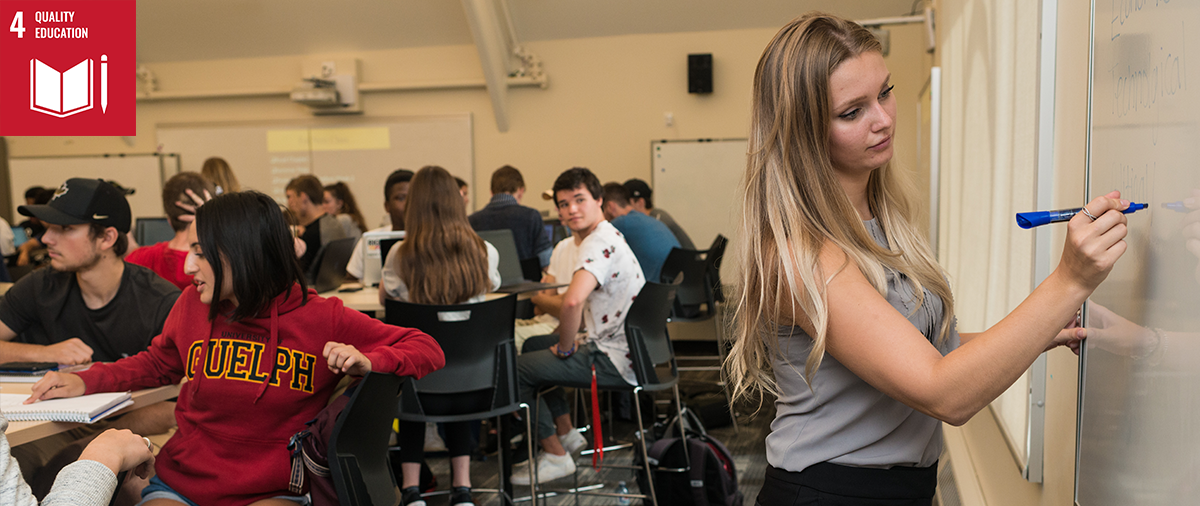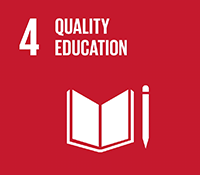
Improving Inequalities
John F. Wood Chair in Entrepreneurship Felix Arndt's research explores how entrepreneurs with disabilities can thrive when starting their business.
Learn more
The University of Guelph is breaking down disciplinary boundaries – students no longer need to be in business to learn the creative entrepreneurial skills necessary for tackling the world’s complex problems. Innovators at the John F. Wood Centre – the Lang School of Business and Economics’ centre for entrepreneurship – are creating transformative opportunities across campus to help students meet rapidly-shifting workforce demands and give them the tools to make real-world impacts in diverse fields.
Melanie Lang and Erin Doherty, Executive Director and Program Manager respectively, and their expert team at the Wood Centre do this through various offerings, with their latest endeavor being the Innovation Toolkit. This module-based training package enables faculty of any discipline to teach their students the in-demand soft skills not normally covered in traditional education but commonly possessed by successful entrepreneurs and entrepreneurial thinkers.
These skills range from active listening to critical thinking and problem solving – and they don’t only help aspiring entrepreneurs. They have the power to help individuals striving to solve complex problems, such as the Sustainable Development Goals outlined by United Nations, or even simply help students reach career goals no matter their field.
Training a large number of educationally-diverse students to tackle major issues from multiple perspectives is surely an important step towards a more sustainable and equitable planet, but the biggest barrier to doing this is often our own mental constructs.
“When people hear entrepreneurship, they tend to automatically assume that only business students can learn these skills but that’s just not the case,” says Doherty.
“This Toolkit unpacks the entrepreneurship narrative so we can reach all kinds of individuals that can tackle all kinds of problems,” adds Lang. “You’d be surprised how often that the people rolling up their sleeves and getting the work done with an entrepreneurial mindset don’t actually identify themselves as entrepreneurs or business people.”
These tools are a compilation of established business strategies structured in a meaningful way to help facilitate learning.
Each module is meticulously designed to help students think about topics in new ways and break through their comfort zones. The tools within each module recognize the entrepreneurial skills required to holistically and effectively address problems, such as actively listening to the needs of those closest to the issue. In this way, they work to satisfy the goal of the module as well as grow the student.
For example, a tool in the problem identifying module, titled ‘Impact Gaps Canvas’, forces students to stop and look at factors in a problem that are commonly overlooked – namely, what is already in place to address them. Often times, attempts to solve the issue identified have already occurred and acknowledging them can seem unnecessary and even uncomfortable.
This tool helps to create a better understanding of the current landscape of the issue and its knowledge gaps – sometimes the best solution isn’t to create something new but to build upon or better support an existing network of solutions. Doing this allows the individual to critically analyse the scenario and put time and energy into what has the most potential to create the desired impact.
The new Toolkit has already been successfully incorporated into the curriculum of a non-business course on campus called Agriculture and Food Issues Problem Solving. This course, based out of the Ontario Agricultural College, used the Toolkit to encourage their senior students to create solutions for real issues in today’s food and agricultural industry. They worked through the tools to map out a complex problem, create a solution, and identify how they would implement it. Over 1,000 students across campus have engaged with the Wood Centre's Toolkit.
The Wood Centre also offers a number of workshops and events that help bring these types of ideas to life. The Wood Centre's “Improve Life Challenge” asked groups of students to build and pitch a feasible solution to a problem faced by a participating industry partner – all in a single day. Undergraduate students working in multi-disciplinary groups hit the ground running with their entrepreneurial skills to compete for first place.
The winning team found a way to limit environmental contamination caused by wastewater from Wellington Brewery - an innovative microbrewery when it comes to sustainable practice. The winning team identified how the facility could remove solid waste from their wastewater and repurpose some of it. This both limits the impact of wastewater that comes into contact with the environment and gives some newly isolated waste products a second life.
The Wood Centre continues to build new opportunities, like the Innovation Toolkit, and support well-established programs that have shown to foster student ideas. In 2014, the Centre launched their Hub Incubator program, U of G’s first home for student startups. The program helps students with innovative ideas and turns them into scalable businesses through funding, mentorship and a supportive environment. The incubator has grown its intake each year since its inception. They also offer advanced workshops and resources to help students push their more established innovations to the next level in The Hub Build program – this takes their ideas from the incubator and helps them build real-life prototypes.
Whether it’s through their own programming or through connecting students with the right industry partners to support their growth, the John F. Wood Centre is doing what it takes to give students the tools and skills to take on the world’s many challenges.
“We are proud to have created a robust program that meets people where they’re at, regardless of their degree and level of study,” says Lang. “We have many ongoing programs to benefit not only our business students but any student willing to step out of their comfort zone and learn these entrepreneurial skills,” adds Doherty.
Learn more about Lang's John F. Wood Centre


John F. Wood Chair in Entrepreneurship Felix Arndt's research explores how entrepreneurs with disabilities can thrive when starting their business.
Learn more
Discover more stories of how the Lang School is helping achieve SDG#4: Quality Education
Learn more